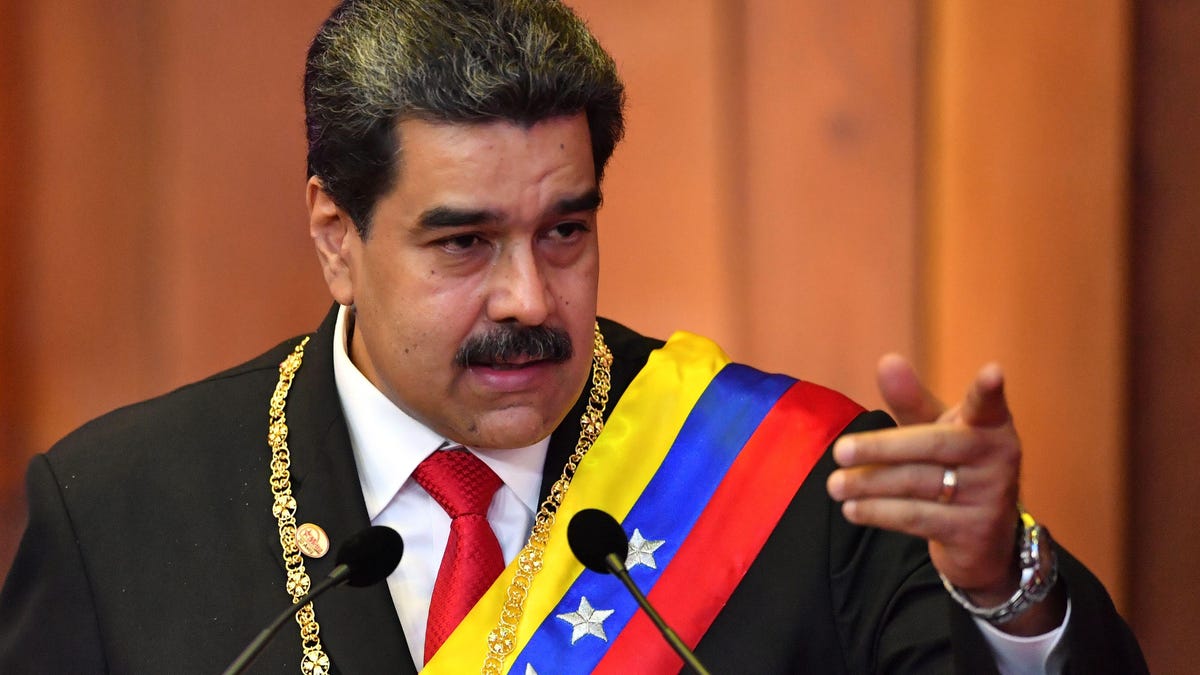Facebook freezes Venezuelan leader's account over COVID misinformation
President Nicolas Maduro's account will be "read-only" for 30 days.

Nicolas Maduro has been pushing a COVID-19 cure.
After overseeing the political and economic collapse of his country, Venezuelan President Nicolas Maduro has finally faced a freeze on his Facebook account -- for spreading misinformation about COVID-19. He has become the second world leader to have his social-media rights revoked this year, after the much-publicized Twitter and Facebook bans of former US President Donald Trump.
Since January Maduro has been promoting Carvativir, a Venezuelan-made liquid that he claims can cure COVID-19. Since Carvativir, which appears to be mostly herbal, has not been verified as a way to treat COVID-19, Maduro's claim has been classified by Facebook as misinformation. His account last posted on Friday.
"We removed a video posted to President Nicolas Maduro's Page for violating our policies against misinformation about COVID-19 that is likely to put people at risk for harm," a Facebook spokesperson said to CNET. "We follow guidance from the WHO that says there is currently no medication to cure the virus. Due to repeated violations of our rules, we are also freezing the page for 30 days, during which it will be read-only."
Venezuela's Ministry of Information fired back, condemning Facebook for targeting information it claims helps fight the coronavirus. "We are witnessing a digital totalitarianism exercised by supranational companies who want to impose their law on the countries of the world," Venezuela's Ministry of Information said in a statement to Reuters.
Maduro is classified by the US government as a dictator due to the country's ongoing presidential crisis, which began even before the 2018 election that Maduro won but was widely believed to be illegitimate. The country's economy collapsed in the years before COVID-19, with its GDP halving between 2014 and 2019 and inflation reaching 10 million percent, making it particularly vulnerable to the pandemic. The country has officially recorded only 156,000 cases and 1,555 deaths, but those numbers have been questioned by experts. Peru, a country with a similar-sized population, has recorded 1.6 million cases.
Trumpeting the supposed Carvativir cure is a "feeble attempt by Maduro to convince parts of the Venezuelan population that his government is developing local solutions to global problems," according to Anthea McCarthy-Jones, senior lecturer at the University of New South Wales' school of business and researcher of Latin America. She applauded Facebook's action as a much needed one.
"In the past figures such as President Maduro have benefited from the inaction of these companies," she explained. "President Maduro's use of social media has been in desperate need of fact checking and moderation by third parties."
With the country's COVID-19 reporting already in doubt, Maduro in January claimed the Carvativir solution had been able to rehabilitate even the most serious cases of COVID-19 during the nine months it had been studied. "Ten drops under the tongue every four hours and the miracle is done," Maduro said at the time. "It's a powerful antiviral, very powerful, that neutralizes the coronavirus."
These claims have been questioned and contested by doctors and medical professionals, however. "The treatment claim for Carvativir's brand for COVID-19 is unsubstantiated by any clinical data," tweeted Francisco Marty, infectious diseases doctor at Brigham and Women's Hospital, a medical facility and research center affiliated with Harvard Medical School.
Nikolai Petrovsky, a professor of medicine at Flinders University and secretary-general of the international immunomics society, sees no evidence to believe Maduro's claims.
"It seems it is not an actual drug or vaccine as the name might imply but rather is an ill-defined herbal concoction," Petrovsky said to CNET in an email. "It seems it might have some relation to Carvacrol (from which the name Carvativir seems to derived), both are described as extracts of oregano oil. ... There is no published scientific basis for believing any of these have activity against clinical disease with COVID-19."
Twitter has yet to follow Facebook's move. On Sunday, Maduro tweeted instructions to his 3.8 million followers, directing them to another Facebook page on which to watch his videos.

